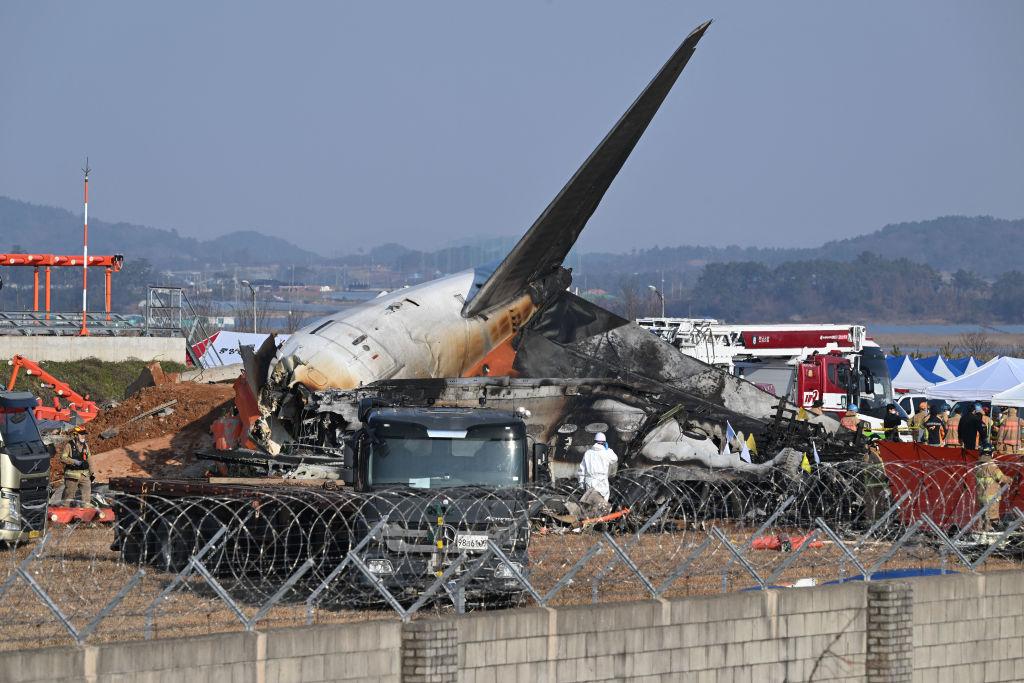A crucial piece of the puzzle in South Korea’s deadliest aviation disaster has gone missing, potentially delaying the investigation into the cause of the crash that claimed 179 lives. Investigators examining the wreckage of Jeju Air Co. Flight 2216 at Muan International Airport revealed that a critical component of the flight data recorder (FDR) is missing.
The devastating crash occurred on Sunday morning when the aircraft, carrying 179 passengers and six crew members, exploded upon landing. As authorities race against time to determine the cause, the absence of this vital connector may leave critical questions unanswered for weeks or months.
Missing Connector Hampers Investigation
The flight data recorder, commonly referred to as one of the two "black boxes," is designed to record crucial aircraft parameters, including altitude, airspeed, and engine performance. However, the connector linking the data storage unit to the power unit has been lost, according to a senior official from South Korea’s Ministry of Land, Infrastructure, and Transport.
Without this connector, recovering vital flight details that could explain the sequence of events leading up to the crash becomes significantly more challenging. Authorities have yet to confirm whether the missing component was dislodged during the crash or mishandled during the recovery process.
The investigation team is also analyzing the cockpit voice recorder (CVR), which remains intact. Experts believe it may provide some insight into the pilots' actions and communications in the moments before the explosion. However, the FDR’s absence of critical data could leave a gap in understanding the technical factors contributing to the disaster.
Crash Leaves South Korea in Shock
The Jeju Air tragedy has shaken South Korea, marking the nation’s worst aviation disaster in decades. Witnesses described harrowing scenes as emergency responders fought to contain the inferno and evacuate survivors. Of the six crew members, none survived, and authorities are now focusing on identifying the cause of the explosion.
Preliminary theories range from engine failure to possible bird strikes during descent, but without a fully functioning FDR, the process of elimination becomes painstakingly slow. Aviation analysts caution that the final report could take months to compile.
Public Reacts With Grief and Frustration
As news of the missing FDR component spread, social media erupted with a mix of grief, frustration, and speculation.
Twitter user @AviationAddict wrote, “How does a critical part of the black box go missing? This feels like negligence all over again.”
Another user, @KPopFanatic99, added, “My heart goes out to the families. They deserve answers, not delays.”
Meanwhile, @SeoulLocalObserver demanded accountability, tweeting, “This is unacceptable. The government needs to ensure that aviation standards improve after this.”
Others expressed anger at Jeju Air Co. itself. User @ConsumerRights called out, “Jeju Air owes the public an explanation. What’s going on with their maintenance protocols?”
Not all reactions were critical. “Let’s not rush to conclusions,” posted @PilotSpeak. “Investigations take time, especially in cases like this.”
Finally, @GlobalSafetyWatch urged patience, saying, “Aviation accidents are complex. Let’s allow experts to do their job without undue pressure.”
A Long Road to Closure
As families of the victims wait for answers, aviation experts emphasize the need for meticulous investigation to prevent future tragedies. With international agencies offering support, South Korea’s aviation authorities face mounting pressure to resolve the missing FDR issue swiftly. For now, the nation mourns while seeking accountability and safety reforms.



 U.S. Begins Charter Evacuations as Iran Conflict Disrupts Middle East Air Travel
U.S. Begins Charter Evacuations as Iran Conflict Disrupts Middle East Air Travel  Santander’s $12.2B Webster Financial Deal Faces Uncertainty Amid U.S.–Spain Trade Tensions
Santander’s $12.2B Webster Financial Deal Faces Uncertainty Amid U.S.–Spain Trade Tensions  U.S. Senate Rejects War Powers Resolution Aimed at Halting Trump’s Military Campaign Against Iran
U.S. Senate Rejects War Powers Resolution Aimed at Halting Trump’s Military Campaign Against Iran  U.S. Preparing Possible Corruption Charges Against Venezuelan President Delcy Rodriguez
U.S. Preparing Possible Corruption Charges Against Venezuelan President Delcy Rodriguez  Trump Signals Support for John Cornyn in Texas GOP Senate Primary as Party Seeks to Avoid Runoff
Trump Signals Support for John Cornyn in Texas GOP Senate Primary as Party Seeks to Avoid Runoff  Brazil Senate Approves Mercosur–EU Trade Agreement After Decades of Negotiations
Brazil Senate Approves Mercosur–EU Trade Agreement After Decades of Negotiations  European Allies Deploy Air Defenses to Cyprus After Drone Attack on RAF Akrotiri Base
European Allies Deploy Air Defenses to Cyprus After Drone Attack on RAF Akrotiri Base  Young Trump Voters Divided After U.S. Strike on Iran and Death of Ayatollah Khamenei
Young Trump Voters Divided After U.S. Strike on Iran and Death of Ayatollah Khamenei  Senators Urge Better Coordination After Texas Counter-Drone Incidents Disrupt Airspace
Senators Urge Better Coordination After Texas Counter-Drone Incidents Disrupt Airspace  Suspected Iranian Drone Hits CIA Station at U.S. Embassy in Riyadh Amid Rising Middle East Tensions
Suspected Iranian Drone Hits CIA Station at U.S. Embassy in Riyadh Amid Rising Middle East Tensions  Nepal General Election 2026: Youth Protests, Political Change, and a New Generation of Voters
Nepal General Election 2026: Youth Protests, Political Change, and a New Generation of Voters  U.S. Military Strikes on Iran Complicate Xi-Trump Summit and Expose China’s Energy Risks
U.S. Military Strikes on Iran Complicate Xi-Trump Summit and Expose China’s Energy Risks  Spain Denies Deal With U.S. Military After Trump Threatens Trade Cutoff
Spain Denies Deal With U.S. Military After Trump Threatens Trade Cutoff  Trump Offers U.S. Insurance and Naval Escort for Tankers as Strait of Hormuz Crisis Disrupts Global Oil Trade
Trump Offers U.S. Insurance and Naval Escort for Tankers as Strait of Hormuz Crisis Disrupts Global Oil Trade  Australia and Canada Strengthen Critical Minerals Partnership Through New G7 Alliance Agreements
Australia and Canada Strengthen Critical Minerals Partnership Through New G7 Alliance Agreements 






























